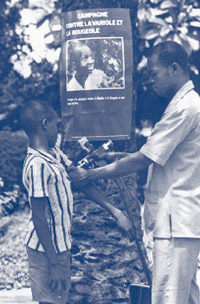|
|
|
Smallpox Eradicator Receives Lasker Award
|
|
|
 |
|
|
In the early 1970s, a boy receives a vaccination at an outdoor clinic in Africa.
|
|
|
|
|
|
|
|
Smallpox. The single biggest killer in the 20th century. In 1966, when Dr. William Foege began working on a smallpox epidemic in Nigeria, the disease was killing millions per year worldwide. Largely because of the strategy introduced then by Foege, 13 years later, in 1979, the World Health Organization was able to declare smallpox eradicated from nature.
A 1961 alumnus of the UW School of Medicine, Foege received the 2001 Albert and Mary Lasker Foundation Award for Public Service. The award recognized his career of service to global health.
Dr. Reimert Ravenholt, a Seattle/King County Health Department epidemiologist who was on the UW clinical faculty and later an associate professor of preventive medicine, guided Foege into public health work. Among other projects, Foege worked for Ravenholt in surveying water-borne illnesses on Lake Washington beaches. Ravenholt suggested in 1962 that Foege join the Epidemic Intelligence Service of the Centers for Disease Control (CDC).
Four years later, emulating his childhood hero Albert Schweitzer, Foege joined a Lutheran medical mission in Africa.
In Nigeria, the surveillance/containment strategy that Foege conceived was born out of necessity. His team couldn’t get enough vaccine for mass vaccinations. Instead, they identified the geographic hot spots, used their limited vaccine supplies to immunize everyone at risk within that confined region, and mounted careful surveillance to spot further outbreaks. Against all expectations, it worked.
On his return to the United States, Foege was appointed head of the CDC’s smallpox eradication program. In 1973, he tested the strategy in India, where few believed it could work because of overcrowded conditions.
“In May 1974, India had the highest levels of smallpox in decades. Twelve months later, it was zero,” Foege recalled.
So began the planet-wide program of eradication. After its successful conclusion, Foege was CDC director for six years. Afterwards, he headed the Carter Center in Atlanta and helped launch the Task Force on Child Survival. He concentrated on childhood immunization programs against Guinea worm disease, polio and river blindness. Now semi-retired, Foege is a distinguished fellow with the Gates Foundation’s Global Health Program.
Despite the emergence of antibiotic-resistant infectious diseases and the gnawing thought that smallpox still exists in storage and could one day be used as a weapon -- a prospect Foege described as giving him “a real sense of betrayal” -- he remains an optimist.
Foege sees the start of a turnaround for AIDS in Africa and lauds new efforts funneling public and private resources into global health campaigns. Polio and Guinea worm disease are almost eradicated.
“I’m enthusiastic about eradication,” Foege said. “You do it only once in the history of the world and it benefits everyone who will ever live.”
|












